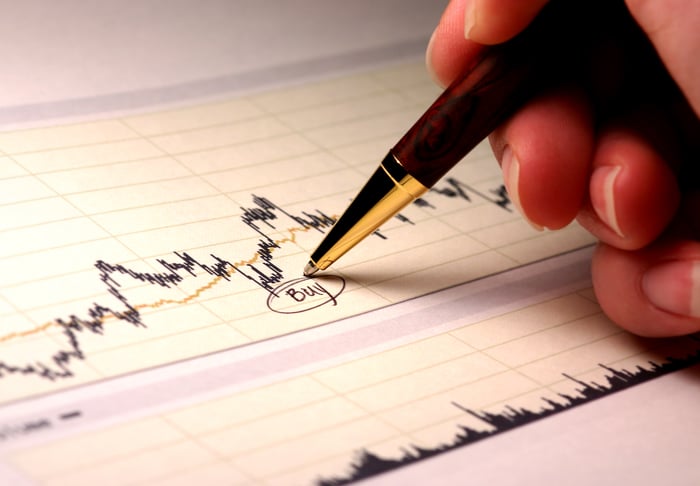In his 2018 shareholder letter, Berkshire Hathaway (BRK.A -0.28%) (BRK.B -0.68%) CEO Warren Buffett candidly announced why he and his investment team have been reluctant to put the company's record $128 billion in cash to work. Said Buffett:
In the years ahead, we hope to move much of our excess liquidity into businesses that Berkshire will permanently own. The immediate prospects for that, however, are not good: Prices are sky-high for businesses possessing decent long-term prospects.
However, businesses possessing decent long-term prospects no longer have sky-high valuations, thanks in part to the panic created by the spread of coronavirus disease 2019 (COVID-19).

Berkshire Hathaway CEO Warren Buffett at his company's annual shareholder meeting. Image source: The Motley Fool.
As of March 7, the World Health Organization had confirmed nearly 102,000 cases of the lung-focused illness, as well as almost 3,500 deaths. With containment and mitigation efforts failing in some regions of the world, there's real concern about both the loss of life and supply chain disruption for the foreseeable future. These fears are responsible for sending all three of the major U.S. stock indexes deep into correction territory.
But as Buffett has shown in the past, day-traders' pain is his long-term gain. Buffett has made a living of being greedy when others are fearful and has, most certainly, been putting some of Berkshire Hathaway's record cash hoard to work over the past two-plus weeks.
Based on filings with the Securities and Exchange Commission (SEC), we already know that Buffett added a little over 976,000 shares of Delta Air Lines (DAL -2.62%) to its portfolio. However, the reporting of this purchase is unique given that Berkshire owns a greater than 10% stake in Delta. Finding out every buy and sell the Oracle of Omaha has been up to won't be known with certainty until mid-May, when 13F filings with the SEC are made public. But given Buffett's penchant for value and his recent buying history, I believe the following three stocks were likely added to during this correction.

Image source: Getty Images.
JPMorgan Chase
If there's one thing Warren Buffett absolutely loves, it's banks. They're moneymaking machines in the eyes of Buffett, and he generally seeks out financial institutions that have a brand name appeal and superior return on assets (ROA). Thus, with JPMorgan Chase (JPM 0.49%) losing 21% of its value over a 12-session stretch (through this past weekend), as well as seeing its longtime CEO Jamie Dimon undergo emergency heart surgery, which likely exacerbated short-term fears, Buffett likely went on the offensive.
Unlike some of Buffett's largest money-center bank holdings, Berkshire only holds a 1.9% stake in JPMorgan Chase, which offers plenty of room for equity stake expansion. Even with a surprise 50-basis-point federal funds target rate cut from the Federal Reserve, which can adversely affect the net interest income earning power for banks, Buffett is liable to expand his ownership in JPMorgan Chase given its generally superior 1.37% ROA over the trailing 12 months.
Buffett is also a fan of old-school banking, and that's what JPMorgan Chase offers. Whereas most money-center banks are closing branches to reduce noninterest expenses, Chase opened more than 70 branches last year in 16 new markets, all while continuing to invest in digital banking and mobile apps that'll help it reach a new generation of customers.
In short, JPMorgan Chase is going to be just fine (as will Jamie Dimon), and Buffett knows it.

Image source: Getty Images.
U.S. Bancorp
Keeping with the theme of banks, it would be really surprising if the Oracle of Omaha didn't add to his existing position in U.S. Bancorp (USB 1.56%). Berkshire Hathaway held an 8.7% stake in the company, as of Dec. 31, 2019.
U.S. Bancorp is another one of those old-school money-center-type banks that Buffett loves to buy. While many big banks got sucked into derivatives and other risky investments prior to the financial crisis a little over a decade ago, U.S. Bancorp has continued to stick with the bread-and-butter of banking. Namely, it grows its deposits and loans and keeps a close eye on its expenses, thereby reaping the rewards of net interest income.
In 2019, the company delivered total deposit and loan growth of 4% and 3.6%, respectively, with net revenue increasing at a slightly faster pace than noninterest expenses. Further, U.S. Bancorp's 1.45% ROA remains among the best in the banking industry, which is a big reason it announced a healthy $5.6 billion capital return policy in mid-2019.
With U.S. Bancorp's dividend yield approaching 4% and the company's stock nearing a four-year low, I'm fairly confident that Buffett likely nibbled a bit.

Image source: Getty Images.
Occidental Petroleum
If you thought banks have been hit hard during this correction, then you haven't been paying close enough attention to the oil and gas industry. Through this past weekend, West Texas Intermediate crude was down roughly 33% from where it began the year. This is on the heels of a record per-day decline in crude demand (3.8 million barrels less per day, per IHS Markit) from the previous year. This sudden decline in crude demand has pushed Berkshire Hathaway holding Occidental Petroleum (OXY -0.09%) lower by 35%, year to date.
For those who may remember, Buffett has been a buyer of Occidental Petroleum in each of the past two quarters. This is after Berkshire Hathaway agreed to invest $10 billion into Occidental in April 2019 to assist with its acquisition of Anadarko. Although energy has never been a particularly large component in Berkshire's investment portfolio, Buffett has plainly stated that he believes oil prices will rise over time. Thus, Berkshire's growing bet on Occidental is a long-term bet on higher oil prices.
There's a reasonable value proposition here, too, as long as crude prices rebound at some point within the next few years. Occidental Petroleum ended last week at 98% of its book value and at less than 3 times its cash flow. Both of these figures are at least decade lows, with Occidental averaging closer to 5.5 to 8.5 times cash flow immediately following the Great Recession.
Having already placed $10 billion behind the Anadarko deal, and with Berkshire's once-prominent Phillips 66 stake reduced to a token holding, it's extremely likely that Buffett added to Occidental Petroleum during this correction.





